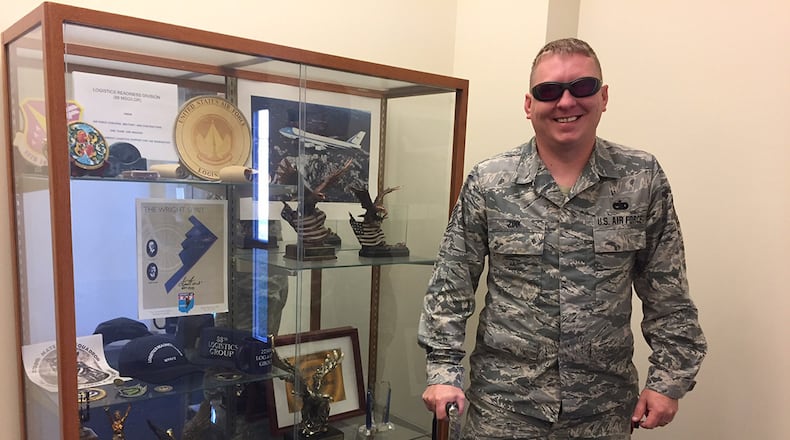In 2011, Zink’s unit deployed to Camp Leatherneck, an Afghan Armed Forces base in Helmand Province, Afghanistan. As Zink headed back to his bunk to get some rest after duty, he blacked out while standing, and his face hit a protective barrier. With no one around, he regained consciousness and commando-crawled on his elbows to his commander’s container.
Medical tests revealed his traumatic brain injury was the result of a brain tumor.
“It was pretty bizarre to find a brain tumor in a tent in southern Afghanistan,” Zink said.
He was eventually transported to Wright-Patterson AFB, and a neurosurgeon at Miami Valley Hospital removed the tumor. While the surgery was successful, his balance, coordination and sight have been affected, resulting in good and bad days with migraines.
His status is a disappointment, he said, because he wanted to remain in the military, attain the rank of master sergeant and retire after 20 years.
“I didn’t want the tumor to win, but I tend to fall to the right and back,” he said, noting he has suffered a number of concussions from falls. “I use my cane as kind of a kickstand.”
Husband to Amanda and father to 2-year-old Daniel, Zink is awaiting another medical board that will take into account his profile, LOD, post-traumatic stress disorder and other deficits. In the six years since his TBI and surgery, the 34-year-old has developed some recommendations for anyone who suffers from LOD or who supervises such a person:
• Document all LOD injuries and re-injuries
• Do research and present it to the primary care physician
• Push to get the right care from a specialist, if necessary
• Try to learn as much as possible about the LOD and medical board processes
Zink also advises any servicemember suffering from a brain injury to be evaluated as soon as possible and enter a polytrauma/TBI system of care for specialized treatment and rehabilitation.
He said he is grateful for the help and consideration he has received.
“The 88th Logistics Readiness Squadron has been phenomenal in allowing me to do my light duty here,” he said. “The folks at Wright-Patterson Medical Center have been top-notch, too.”
Zink also is enthusiastic about the Air Force’s Wounded Warrior Program, which he learned about from his recovery care coordinator, Cathy Dunwiddie. Through that, he has learned how to compensate for his injuries, enjoy adaptive sports at various camps and act as an ambassador to talk to senior leadership about his experiences.
“That really helped – I regained my archery skills and also was given a three-wheel recumbent bicycle,” Zink said. “It helps with morale and gives me the chance to make friends, adapt and do things I used to like to do.”
About the Author
